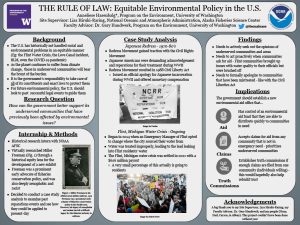The Rule of Law: Equitable Environmental Policy in the United States
As climate change continues to affect weather patterns, ecosystems, and human infrastructure, often for the worse, life in this country will change dramatically. It is the responsibility of the government to support their communities and provide aid in times of need. The purpose of this study was to analyze two historical cases of legal action focused on underserved communities, the Japanese Redress movement of the 1970’s and 80’s, and the Flint, Michigan water crisis. I believe that these cases and similar early reparations-style policy could be used to to assist the United States government develop environmental crisis remediation policy. My work with the National Oceanic and Atmospheric Administration Alaska Fisheries Science Center (NOAA AFSC) provided me with many resources connected to the Japanese incarceration during the Second World War, as well as information on many diversity initiatives. I conducted online research about both cases to build my analysis, as well as examining research on environmental inequity, reparations, and relationship management. A governmental office that could accept communities’ claims for aid in cases of environmentally-based tragedies, as well as give those communities a platform to control the public narrative of their story could be beneficial to communities in need and reduce human suffering. By developing federal policy that could more effectively and equitably distribute aid to communities in need, the government would be better prepared to address environmentally based crises.
